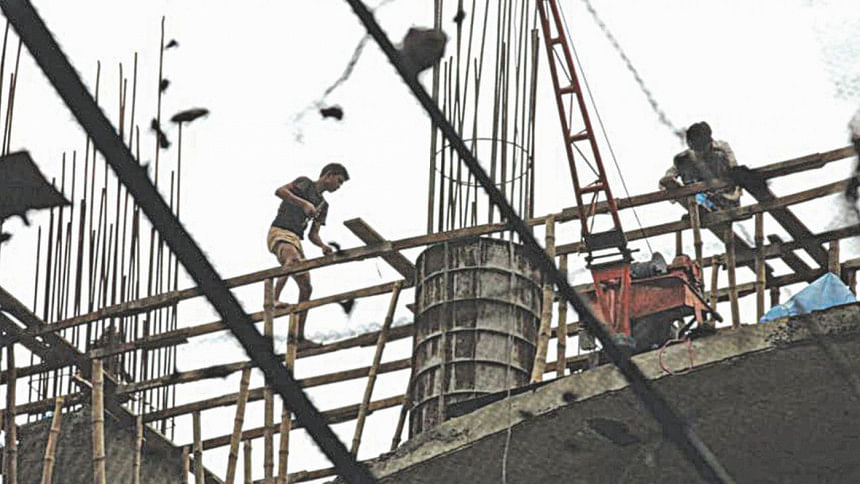Six requirements under Bangladesh labour law that can help prevent the spread of Covid-19

As we face an upsurge of Covid-19 cases, and with the national lockdown being lifted, the need to prioritise effective preventive measures has never been greater. One common place where Covid-19 transmissions occur is the workplace, especially in industrial settings. Therefore, the World Day for Safety and Health at Work seems as good a day as any to recall six provisions of the Bangladesh Labour Act 2006 (BLA), which can play an immense role in preventing the spread of infectious diseases like Covid-19, but the existence of which seems largely unknown or conveniently forgotten.
First, Section 51 of the BLA requires every establishment to be kept clean and free from effluvia arising from any drain, privy or any other nuisance. In particular, dirt is to be removed by sweeping the floors, workrooms, staircases, and passages of the establishment on a daily basis. In washing the floor of workrooms, disinfectants must also be used if necessary (which they certainly are at the moment).
Secondly, Section 52 of the BLA requires every establishment to make arrangements for adequate ventilation to ensure circulation of fresh air in every workroom. As experts have said time and time again, ensuring adequate ventilation within indoor settings is essential to mitigate the risks of spreading Covid-19.
Thirdly, Section 56 of the BLA prohibits overcrowding and states that "no workroom in any establishment shall be overcrowded to an extent injurious to the health of the workers employed therein". In our current context, this should mean that workrooms should not be overcrowded to the point where maintaining a minimum distance of six feet between co-workers is no longer possible.
Fourthly, Section 59 of the BLA requires every establishment to have in place a sufficient number of sanitary toilets and washrooms—which are suitably located—so that the workers employed therein at the time of work may use them easily. Furthermore, all toilets and washrooms must also be kept in a clean and sanitary condition at all times, with suitable detergents and disinfectants present at the cost of the employer.
Fifth, Section 91 of the BLA requires every establishment to have in place a sufficient number of bathrooms and washing facilities for workers to use. These facilities must be kept clean at all times and be easily accessible to workers. This is especially important so workers are able to wash their hands and any other part of their body.
Finally, under Section 116, all workers (except newspaper workers) are entitled to sick leave with full wages for 14 days in a calendar year. Coincidentally, two weeks is also usually the time taken to be able to detect whether someone has in fact contracted Covid-19 and, in mild cases, the time taken for the infected person to become non-contagious. Newspaper workers are entitled to sick leave "with half wages for not less than one-eighteenth of the period of services". Perhaps to balance this distinction, Section 98 of the BLA specifically entitles newspaper workers and their dependents to medical care at the cost of the newspaper establishment, as determined by the Bangladesh Labour Rules 2015.
Like many of our laws, these six provisions in the BLA may seem very ambitious for industrial sectors, where non-compliance appears to be the norm. In theory, however, if any person contravenes any provisions of the BLA which results in loss of life, serious bodily injury, or any danger to workers or any other persons in an establishment, Section 309 of the BLA subjects them to varying penalties. For instance, if this contravention results in the loss of a life, the punishment can be up to four years of imprisonment and/or fine of up to Taka one lakh. Therefore, if any person fails to uphold the abovementioned safeguards—which causes workers to contract Covid-19—at least in theory, they would be liable to imprisonment and/or a fine, depending on the level of harm that is caused. However, the key challenge here would be to prove that it was their breach that caused any given worker or person to contract Covid-19. Therefore, it is important for these six safeguards to be enforced proactively through spot inspections and on the basis of complaints received, rather than doing so reactively through the enforcement of penalties, after harm has already been caused to workers' health.
That is precisely why inspectors from the Department of Inspection for Factories and Establishments (DIFE), under the Ministry of Labour and Employment, must rise to the occasion. DIFE has been entrusted with enforcing all provisions of the BLA (except Chapters 13 and 14 of the BLA, which relate to trade unions and industrial relations, and Labour Court procedures, respectively). On January 15, 2014 the Ministry of Labour and Employment issued a government order which upgraded DIFE from a directorate into a department, with a headquarters and 23 district offices, and expanded it by tripling its workforce and creating 679 new posts (of which 575 were designated for inspectors). Previously, DIFE had only 314 staff members. In 2014, the government formed a high-level National Industry Health and Safety Council to accelerate efforts to boost occupational safety. This Council is chaired by MOLE, and has employers and trade unions as members.
In January 2019, DIFE introduced a five-digit helpline number (16357) for receiving complaints. Therefore, it may be worthwhile to disseminate this number widely among workers through electronic, print, and telephonic means so they may report violations occurring in establishments that increase the spread of Covid-19. These complaints should be met with immediate spot inspections and necessary disciplinary action.
In October 2020, DIFE issued a national Occupational Safety and Health (OSH) guideline on creating safe and effective return-to-work conditions during the Covid-19 pandemic, with technical support from the OSH Council and ILO. The guideline reiterates national labour standards and includes recommendations based on international best practices. Appendix 9 to the OSH guideline lists "notable initiatives taken by DIFE to prevent Covid-19 infection" since March 2020, such as provision of telemedicine services and dissemination of information materials to raise health awareness. However, there is no mention of the number of inspections undertaken during the pandemic to assess compliance with occupational safety and health requirements under the BLA, or any examples of disciplinary action being taken against non-compliant factories (of which I am sure there were many). While the initiatives listed are indeed notable and this guideline is certainly significant, it is just as important to enforce legal obligations of industrial employers on ensuring occupational safety and health under the BLA, since guidelines are merely advisory while laws are binding. These six safeguards can go a long way in mitigating the spread of a deadly disease in a country where it has been seemingly decided that "business must go on".
Taqbir Huda is a Research Specialist at Bangladesh Legal Aid and Services Trust (BLAST) and coordinates Justice for All Now (JANO), Bangladesh. Email: [email protected]

 For all latest news, follow The Daily Star's Google News channel.
For all latest news, follow The Daily Star's Google News channel. 



Comments